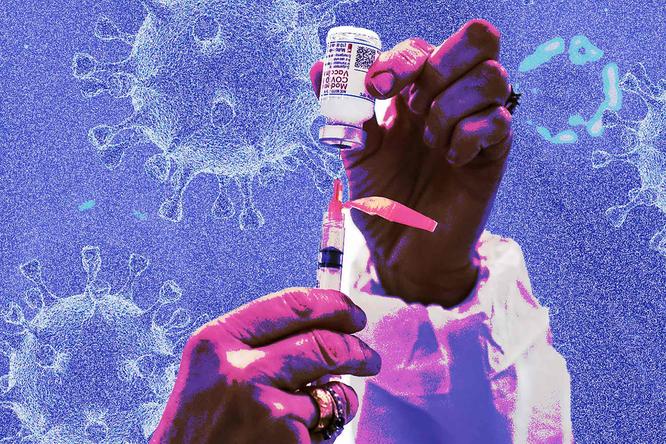Photo by Jackie Ricciardi
Public HealthWhen so much wrong information is readily available, convincing people to get vaccinated has proven to be a huge challenge
August 13, 2021161TwitterFacebookMyth: pronounced mith; noun; definition: a widely held but false belief or idea; synonyms: misconception, fallacy, fantasy, fiction.
Among the many reasons COVID-19 vaccination rates in the United States peaked earlier than experts hoped—then, rather than crescendoing into the summer months, began trending downward—are myths that took hold among the unvaccinated and solidified as their reasons not to get the shots. The vaccine will make women sterile; the vaccines are too new; the shots have a microchip in them; the vaccine itself will give me COVID; I’m immune because I had COVID; breakthrough cases prove vaccines are useless.
There are more. And none of them are true.
But no matter how convincing and irrefutable the science and the data about the COVID-19 vaccines are, misinformation spreads so easily and quickly—largely through social media networks—that it has become a major barrier stopping the United States from reaching higher levels of vaccination (190 million people, or 57 percent of Americans, have received at least one shot) that would bring us closer to herd immunity.
So let’s cut to the chase. Myth vs. Fact. The Brink took some of the most widespread myths to two leading infectious disease experts, Davidson Hamer, a faculty member of BU’s School of Public Health, School of Medicine, and National Emerging Infectious Diseases Laboratories, and Sabrina Assoumou, a BU School of Medicine assistant professor of medicine and of infectious diseases and a Boston Medical Center physician.
If these two experts encountered someone on the street who cited one of these myths as their reason not to get vaccinated, this is what they would say to them. To provide extra context, we include one more fact.
MYTH: The COVID vaccines were not rigorously tested, which is why they have only emergency authorization approval and not full Food and Drug Administration approval. (Update: Pfizer’s vaccine received full FDA approval on August 19)
FACT: “Vaccine developers didn’t skip any testing steps, but conducted some of the steps on an overlapping schedule to gather data faster.”—Johns Hopkins Medicine
Assoumou: This is the most common question I get asked. I think there is a perception that things moved very fast, but we want to underscore that the technology being used now was being studied for a decade. The main difference between emergency use versus full FDA approval is that you need two months of monitoring rather than six months. When you look at the history of vaccines, if patients were to develop side effects, these occurred within two months. We are now over six months into our experience with these vaccines. We have not seen anything that would make us believe that the risks outweigh the benefits. And vaccines have saved so many lives.
Hamer: The development was more rapid than many other vaccines. But it used the same process of phase one and phase two trials following appropriate safety measures. Stage three trials were large-scale trials done rigorously with very clear outcome definitions. The safety measures and approaches taken are standard for clinical trials. They just did it more rapidly than usual. The full process review is ongoing and we are already hearing that Pfizer will have full FDA authorization by September and Moderna soon after.
MYTH: The technology used to create the COVID vaccines is too new to be safe.
FACT: The technology used, called messenger RNA, or mRNA, is not new. Research on it actually began in the early 1990s, and two diseases that are very close to COVID—SARS (severe acute respiratory syndrome) in 2003, and MERS (Middle East respiratory syndrome)—helped bring the mRNA vaccine development to present day use.—Centers for Disease Control and Prevention, Understanding mRNA COVID-19 Vaccines

Assoumou: The reason this is called SARS-COV-2 is that there was a SARS-1, the original one, and scientists were working on this vaccine. So when this pandemic arrived they had already developed a lot of the science. A decade of work was actually going on. That’s one issue I like to emphasize when people think it was rushed.
The other point I like to remind people is that these vaccines went through all the regulatory steps like any other vaccines. None of this was rushed. The FDA reviewed all the data. When you say “Emergency use,” people think it was rushed, but the way to think about it is that the benefits outweigh the risks.
MYTH: Breakthrough cases prove that even if I get the vaccine, I might still get COVID. So why bother?
FACT: As of August 9, the CDC said there had been 8,054 vaccinated people who were hospitalized or died who had also tested positive for coronavirus—out of more than 166 million fully vaccinated Americans. That’s roughly .005 percent. Additionally, CDC director Rochelle Walensky has said that 99.5 percent of all deaths from COVID-19 are in the unvaccinated.—Politifact, Fact Checking Joe Biden’s Figure on Unvaccinated COVID-19 Deaths
Hamer: COVID vaccines have been shown to be very powerful in preventing more severe disease and the need for hospitalization. Breakthroughs occur at a much, much lower rate than in people who are unvaccinated. The breakthroughs have been occurring more frequently with the Delta variant because of the high level of infectiousness (or transmissibility) of the Delta variant and lower protection of current vaccines against this variant. But people having breakthroughs have much more mild infection, more like an upper respiratory infection. The vaccines prevent severe disease and complications and allow people to return to a more normal state.
Assoumou: I was just at the hospital taking care of patients. I can tell you all the cases of people getting hospitalized are unvaccinated. Breakthrough cases account for much less than 1 percent. There are so many zeros before the one—99 percent of people dying now of COVID are unvaccinated. And 97 percent of those hospitalized are unvaccinated. We are just not seeing large numbers of people vaccinated being hospitalized. And if you get it, for the most part it is like having a cold.
MYTH: The COVID vaccines can affect a woman’s fertility.
FACT: This rumor started after a report claimed inaccurately, yet circulated on social media, that the SPIKE protein on this coronavirus was the same as another protein called syncytin-1 that is involved in the growth and attachment of the placenta during pregnancy. It was quickly debunked as false by the scientific community.—STAT News, Shattering the Infertility Myth
Hamer: I think people were worried that the messenger RNA in these vaccines messes with their genes. It doesn’t. It doesn’t even make it into the nucleus of your cells. It won’t intervene with any metabolic activity.
Assoumou: Ohh, this is so common that I hear this. For young women of childbearing age, it’s a common question. It started with a report that was incorrect and has been debunked. But unfortunately, once the information gets out there, the correct information doesn’t always come through. I tell people that when we look at the mechanism by which these vaccines work, we see that they simply don’t impact fertility.
MYTH: I already had COVID, therefore I don’t need the vaccine. I’m immune.
FACT: “After people recover from infection with a virus, the immune system retains a memory of it,” the National Institutes of Health explains. While that’s good for the immune system, it also means that even after you recover from COVID, it’s still inside your body and can resurface. Studies have been unclear how long immunity lasts after having COVID—most experts believe anywhere from 90 days to six months, though it could be longer.—National Institutes of Health
Assoumou: That’s a very common one. The information we have right now is that vaccines provide a more broad-based immune response that will protect you for a longer period of time. With the mRNA vaccines, you have two shots, one to prime and then another one to boost the immune system. You need the boost to protect you for a longer period of time.
Hamer: After three to six months or so, the natural immunity begins to wane and the risk of reinfection returns. We are definitely seeing people develop reinfections. Receiving the vaccine after having COVID is like a booster effect, and therefore it’s much more effective. Studies have been done comparing those who had the disease versus those who did not, and those who got at least one shot after having COVID end up with very high levels of antibodies.
MYTH: Children do not need to be vaccinated because they do not become sick from COVID-19.
FACT: “Hundreds of children in Indonesia have died from the coronavirus in recent weeks, many of them under age 5.” A five-year old boy in the state of Georgia died of coronavirus in July.—The New York Times , and CNN
Hamer: Children have much milder symptoms and are less likely to be hospitalized. But since children can become infected and transmit the virus, they can serve as an ongoing source of transmission. Everything seems to be changing with the Delta variant. It leads to a much higher viral load. And that includes children.
Assoumou: That’s a very common one. It is true that children are not dying at the same rate as we are seeing in older adults. But children are going to grow up to be adults. We want to protect them as soon as possible. In addition, we are seeing some of the consequences of COVID. Not only deaths. But there is also multisystem inflammatory syndrome (MISC) of children, where children get very sick, and we are still figuring out the details and long-term complications of this syndrome. Then there are emerging data that children are developing long COVID [symptoms that linger]. We have vaccines that are safe and effective in children 12 and above and we’re hoping we’ll have it soon for younger kids.
Also, children are part of the “herd.” When we talk about “herd immunity,” we are referring to the level of immunity when the disease stops spreading in the community. Children are part of the population. Now that we have the Delta variant, we’re going to have to get to an even higher percentage of the population vaccinated to reach population level immunity. Children are part of the community. It will be harder to get to some normalcy if a large proportion of the population remains unvaccinated.
MYTH: I’m vaccinated. So I can drop all my COVID precautions, right?
FACT: Studies have shown that a person infected with the Delta variant of COVID has roughly 1,000 times more copies of the virus in their respiratory tracts than a person infected with the original strain.—CDC, Delta Variant: What We Know About the Science
Hamer: The challenge is that Delta is so transmissible that I am starting to advise people to wear masks again in supermarkets and stores and public places. But Delta is causing outbreaks mostly in unvaccinated people and only in some vaccinated people. Until we get to the point where transmission slows to a trickle, Delta is just more easily spread, and we are quickly learning that it can easily lead to vaccine breakthroughs and even be spread from one vaccinated person to another.
Assoumou: The vaccines are safe, and remarkably effective. But what precautions to take will decide on a lot of factors. For example, where you live. Are you in a place with high vaccination coverage, like Massachusetts, or a southern state with low vaccination coverage and high case rate. It also depends on what activity you are engaging in. Outside not in a crowd, that’s safe. You don’t need a mask, but inside in a crowd where you don’t know who is vaccinated or unvaccinated, then you may still want to follow public health measures. If you have children less than 12, like I do, then you also need to be a little more cautious. In addition, if you have a compromised immune system, then you also need to take some precautions. If you happen to be in a place with high vaccination coverage and a lower case rate, then it might depend on your level of comfort for risk.
I do want to remind people there are still places we should mask up, like the doctor’s office or on public transportation.
MYTH: Getting the COVID vaccine actually gives you COVID.
FACT: It is not medically possible. The vaccine does not contain the virus.—Johns Hopkins Medicine
Hamer: COVID vaccines are not made with live virus SARS-COV-2 virus cells. They are not giving individuals the virus itself so you can’t get COVID from getting the vaccine.
MYTH: A microchip, with the backing of Bill Gates, is being implanted with the vaccine.
FACT: This one started when Microsoft cofounder Gates said in an interview: “We will have some digital certificates” that could ultimately show who’s been tested and who’s been vaccinated. (Alas, he never mentioned microchips.)—BBC, Coronavirus: Bill Gates Microchip Conspiracy Theory
Assoumou: If you are worried about being monitored, just look at your phone. You’re much more likely to have your activities tracked there. There is no microchip in the vaccine.
(When asked if she is able to able to keep a straight face when someone brings up the microchip to her, Assoumou said: “You have to be empathetic, so that people know you are listening to them.”)
Explore Related Topics:
Share
Myths vs. Facts: Making Sense of COVID-19 Vaccine Misinformation









